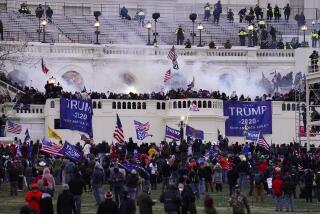Some London residents unhappy with police response
- Share via
Reporting from London — With calm returning to Britain’s damaged cities, residents of some London neighborhoods complained Friday that police had seemed unwilling or unprepared to take on rioters who set fire to cars and looted shops on their streets.
Officials said that about 1,700 arrests had been made nationwide, but Scotland Yard added that the number was “changing all the time.”
Londoners who endured the worst of the violence Monday and Tuesday nights had mixed views of the police response.
Lia Smith, who runs a cafe on Clarence Roadin the low-income East London neighborhood of Hackney, said she watched police in riot gear line up at the end of the road as a crowd moved in Monday evening.
“They smashed up and looted the local shop, a small convenience store down the road, and they burnt every single car in Clarence Road,” she said of the mob. “The police stood and watched for about two hours before they tried to stop things, once everything had been set on fire.”
She said her cafe was not looted but the window cracked from the heat of the car fires.
However, when rioters moved on to central Hackney’s Mare Street, where major retailers such as Marks and Spencer have stores, police “fought much harder,” she said. “They lined up with police dogs and police lines to protect the big businesses, but when it came to local shops and people, they didn’t seem to care.”
Nick Palmer, a self-employed builder, said police stopped the bus he was on in West London late Monday and told passengers to evacuate, saying the road was closed due to rioting.
He said the rioters avoided the police. “I passed a brick wall that had been smashed to provide them with missiles to throw at windows. I picked up a brick and a stick, and with my dog marched through a wall of young thugs coming towards me, looking as mean as I could,” he said. Police did not intervene, he said.
Charles Donovan, a 37-year-old writer, said a woman in upscale Notting Hill told him of overhearing police in the street below asking each other where central London’s Trafalgar Square was.
Police reinforcements were sent in from outside London, and many had no idea of the city’s geography. “Pretty unnerving,” Donovan said.
Heather Shabal, manager of the Le Bijou cafe in St. John’s Wood, a wealthy residential area in North London, reported a better police response.
She watched a gang of 16 hooded and masked youths snatch cellphones and laptops from terrified customers at sidewalk tables outside her cafe Monday night. “They smashed the cafe windows, and all the cups and plates, but didn’t have time to get inside.”
“They attacked the coffee shop round the corner first and they must have called the police …. who’d been roaming in the area and came immediately, chased the gang away and arrested them,” she said.
The group was in a central London magistrates court Thursday. All 16 were denied bail and were referred to a higher court.
Among those arrested Friday was a suspect in the killing of Richard Mannington Bowes, 68, who was beaten by rioters Monday night as he tried to put out a fire. He died in a hospital early Friday, bringing the number of fatalities in the violence to five.
Two men also were arrested on suspicion of shooting a man who was found dead in Croydon, South London, during rioting Monday night.
Courts in London are still working day and night. Most of the defendants are charged with burglary, theft, or arson. Sentences tend to be swift and tough. One boy caught with a case of bottled water from a looted supermarket was given six months in jail.
Those who were released on bail left courts surrounded by television cameras. Some covered their heads; others were openly defiant and hurled abuse at journalists.
Police were quick to answer Prime Minister David Cameron’s statement Thursday that they had been unprepared when violence first broke out Aug. 6.
Hugh Orde, a senior police officer and a former police chief of Northern Ireland’s police force, angrily rejected suggestions that it took politicians returning from vacation to get control of the violence.
“The tactics decided by chief officers and their staff … and the robust policing tactics we chose to adopt, delivered,” he said in a BBC interview.
Stobart is a news assistant in The Times’ London bureau.
More to Read
Sign up for Essential California
The most important California stories and recommendations in your inbox every morning.
You may occasionally receive promotional content from the Los Angeles Times.









